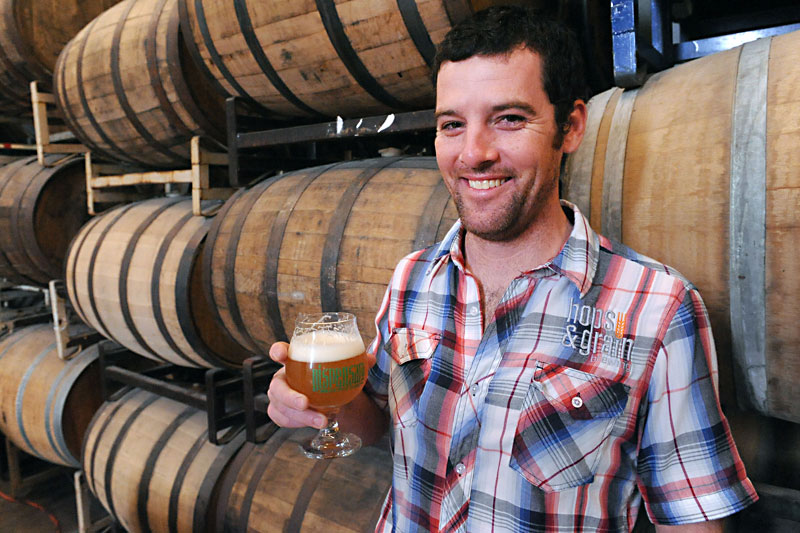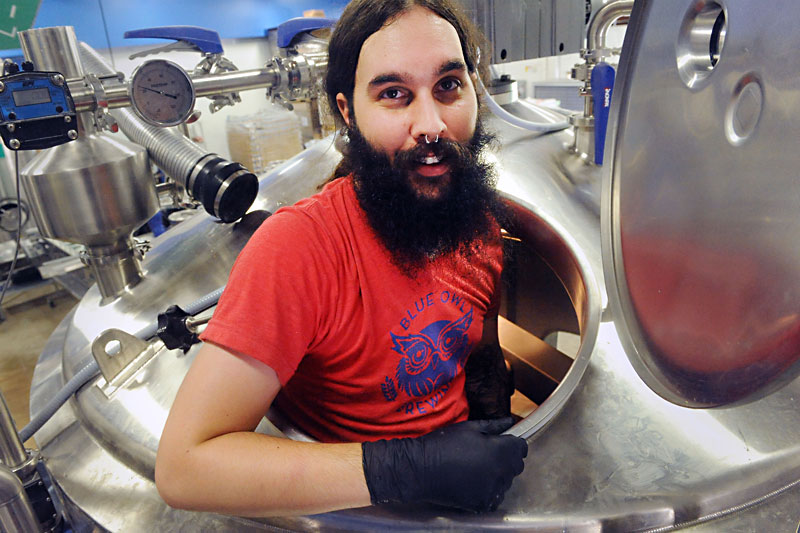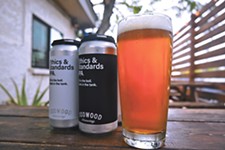Mug Life
Austin isn't a world-class beer destination, but it's close
By Eric Puga, Fri., Nov. 13, 2015
It's difficult to overstate how hungry the Austin beer economy is at the moment. With nearly 50 Central Texas production breweries and brewpubs in various stages of operation, the general drinking public in Austin has been merrily plunking down the biscuits of financial posterity in order to sustain the craft beer industry for over two decades. When first-rate, Austin-area legacy acts like Live Oak, Independence, and Real Ale aren't growing their workshops to elasticize the hems on their ever-expanding market potential, new brewhouses with clever styles and polished taprooms like Blue Owl, Last Stand, and 4th Tap are dispelling the old canard that Austin's craft beer market is too saturated.
Austin is the hub of craft beer in the ascending Southwest region, an area which covers upcoming cities like Houston, Dallas, and Phoenix. The Texas Craft Brewers Guild projects the state's beer industry to grow more than 800% within the next six years, and a 2012 Brewers Association study reported that Texas' craft beer industry contributed over $2.3 billion to the state economy, surpassed only in statewide financial impact by California.
Within this micro-economy of Texas beer, few breweries dominate the regional landscape as much as Austin's Jester King and Live Oak, who produce 55% of the state's top-20-ranked beers according to Beer Advocate. The pair's noteworthy quality as well as general unavailability to those outside of Austin make them compelling brands for beer fans in other states, along with similarly inaccessible packaged stalwarts Austin Beerworks and Hops & Grain.
But despite all of its success and ingenuity and rainmaking and territorial grasp, is Austin classified as a world-class beer destination?
Well, no. Not exactly. At least not yet.
You the Real MVPs
To mollify Austinites of homicidal woe they may feel at the mere suggestion of a lack of superiority, let us first consider who the present exemplars of craft beer culture are.
Portland, Ore., and its culture of connoisseurship is the most obvious example – it is not only synonymous with the practice of making superlative beer, but for having the most per capita breweries in the world. Portland is known as the American flagship for experimental brewing practices at places like Hair of the Dog and Cascade, and also for pioneering the urban American brewery experience. San Diego has benefited by simply being one of the first major cities to get on the craftwagon while adopting artisanal beer as an ingrained way of life. A hefty part of that equation is the seemingly citywide endorsement of the India pale ale as their official beer style, with industry icons like Stone, Ballast Point, Green Flash, Firestone Walker, and Alpine fueling the city with its beer of choice.
As host of the largest, and arguably most important beer festival in the United States, Denver gains much of its brewing prestige from consistent and confident, award-winning breweries like Avery and Great Divide that are themselves anchored by great taprooms. And if one is being geographically generous, the brewery options expand to nearby Odell, New Belgium, and Funkwerks.
Then there are the internationally reputed cities who framed the template for American craft beer, like Munich and Brussels. Munich aggregates the bucket lists of 6 million beer drinkers annually as the ultimate beer destination during Oktoberfest. Meanwhile, Brussels dotes on the irreproachable craftsmanship of its Trappist monks. At the center of Brussels' craft beer culture is perhaps the best small brewery on the planet, Brasserie Cantillon.
But possibly the most comparative example to Austin beer fanatics' lofty goal of international beer relevance is the unlikely neophyte Asheville, N.C., who was designated "Beer City, USA" by the Brewers Association for four years running – 2009, 2010, 2011, and 2012 – when craft beer culture was truly beginning to gain meaning. Asheville achieved this without a significant number of breweries, or really without any nationally regarded breweries at all. With a population under 100,000, it was a feat mostly accomplished by pure enthusiasm. That kind of spirit enticed three major western blue chips to open satellite breweries in Asheville within two years: Sierra Nevada, New Belgium, and Oskar Blues. But even without the spotlight of iconic American breweries setting off to Asheville, its reputation for organically grown hot spots like Wicked Weed and Green Man began to widen.
Bill Communication
Austin's run toward the top flickered to life in 2013, with the largest legislative overhaul for craft beer which allowed for sensible, small-brewer freedoms, like increasing production caps, allowing brewpubs to sell to wholesalers, and granting production brewers the right to sell directly to their in-house consumers – basic rights that have long been predominant in other beer-affectionate states.
Complications from that 2013 legislative session emerged late in the drafting process, however, as concessions were added to placate the Wholesale Beer Distributors of Texas, a dominant alliance of beer distributors who have exclusive rights as middlemen in the three-tier system. The bill's most noteworthy modification was that brewpubs and package breweries would no longer be able to sell their own territorial distribution rights, and instead, would fully relinquish them at no cost to the WBDT. The WBDT could then either chose to distribute the beer to retail outlets or sell those rights to other beer distributors for large profits. This anti-competitive stipulation, worthy of an Internet hoax, cost millions in revenue for some of the better-established Austin breweries. In other states, money that comes from the up-front sale of distribution rights provides necessary income to update equipment, improve facilities, and build taprooms – moves that help improve their brands while expanding market reach. When the bill passed, Texas became the only state with such a restriction in place.
"First and foremost," said Josh Hare, owner/brewer of Hops & Grain Brewery in East Austin, "I think you have to have a number of things in place for a town to really cultivate a great beer culture. Really good beer is at the top of [the] list, followed by customer access to brewery tasting rooms, and transparent businesses that try to cultivate customer interaction. The biggest hurdle that we've had to overcome in achieving these things is the regulatory structure that we operate under."
Those hurdles were quickly apparent when the restrictions were put into practice. While one of the benefits of the 2013 bill was the ability for brewers to sell up to 5,000 barrels a year to their customers directly, it still remained illogically prohibited for breweries to sell their in-house beer for off-site consumption. In other words, a visitor to Hare's brewery could not legally purchase a keg for personal consumption outside the brewery. Nor could an individual legally purchase anything else to-go from the brewery, including growlers or prepackaged six-packs. Whereas this direct-to-customer transaction is very common in other states, it is restricted in Texas to the detriment of craft beer culture and statewide economic potential.
"One of the most vivid memories of my introduction to craft beer [was] in Boulder, Colorado," Hare reflects. "I walked into a brewery called Mountain Sun, sat down for dinner and beers, and then left with a growler full of beer to take home with me. There was something so pure about that experience, and I still to this day believe that there is no greater transaction in our industry than a customer being able to buy beer directly from the producer. It's why people are so drawn to farmers' markets, supporting the producer-to-consumer connection."
Currently, only brewpub license holders in Texas are able to sell beer to-go, a regulation that prompted Jester King to switch from a traditional production brewery to brewpub in 2013. "I think the quality of beer being produced locally stands up to these other cities," states Jester King Brewery co-founder Jeff Stuffings. "It's unfortunate, however, that you can go into a brewery in one of these other cities and buy beer to take home with you, but you can't do that in Texas. It puts us at a competitive disadvantage and holds back the development of craft beer in Austin." Such regulations, of course, are not in place for other alcohol industries, like wineries and distilleries, who have more influential lobbies and a longer tradition in the Texas marketplace. Further still, unlike Texas wineries, Texas breweries cannot ship their beer directly to mail-order customers.
"We love to do events with breweries, but there are so many weird beer laws out there, that working together is oftentimes very prohibitive. It is difficult to even co-market with a brewery," says Mike McKim owner of Cuvée Coffee, who last month was embattled with the Texas Alcoholic Beverage Commission over a dispute regarding the legalities of filling canned growlers – or "crowlers" – from the rotating taps at his store, in violation of a Texas manufacturing law that says only beer-makers can produce cans of beer. The TABC eventually confiscated Cuvée's canning machine, much to the consternation of beer fans in Texas who wanted more options for off-site consumption.
And while each criticism of Austin's beer culture sounds banal compared to the prohibitive and joyless beer laws, there are still components of the scene at the brewery or consumer level that can be fundamentally improved.
Urban Legends
There are few Austin-area breweries who provide the full taproom experiences of some of the more matured beer towns. Founders Brewing in Grand Rapids, Mich., for example, offers visitors a full menu, a roomy beer hall and beer garden, a sampler beer board, take-home growlers and packaged beer, and a slate of entertainment. The brewery even offers reasonable nonalcoholic options for children and designated drivers. These are not unreasonable characteristics of the modern-day taproom. Stone in San Diego, Goose Island in Chicago, Bell's in Kalamazoo, and Great Lakes in Cleveland all offer this experience.
"It's not necessarily that breweries don't want to offer [the full taproom experience] to the customer," notes Chris Troutman, co-founder and editor-in-chief of the Austin Beer Guide. "But right now, it doesn't financially make sense to be open in that way on a Tuesday or Wednesday due to lack of interest. Or they can't even do it because of certain laws. Austin's taproom culture has a ways to go."
Austin's overall taproom culture has, however, generally improved since the earliest days. Breweries like Austin Beerworks, Independence, and Real Ale have transformed idle warehouse spaces into working beer mills, while Oasis, Jester King, and Last Stand have set their estates in the backdrop of the Hill Country. The Austin Beer Garden Brewing Co. ferments their beers behind a fully functional concert stage, and when Live Oak opens up their new East Austin brewery within the next few months, it will feature a contemporary taproom and an outdoor entertainment area.
Despite these innovations, Austin continues to lack the same accessible grouping of urban breweries that characterize entertainment districts in cities like San Francisco and Seattle that make craft beer not only a pervasive pastime, but an intrinsic part of their home turf. Forrest Clark, co-founder of Zilker Brewing Co., one of only a small handful of urban Austin breweries, agrees. "In other cities like Portland and Denver, the urban brewery model has proven successful and it's a format that consumers are excited by," he says, adding, "Our taproom allows us to engage with the local neighborhood and truly be a part of the surrounding community." But Zilker's central location is not the norm.
Several upcoming breweries in the Austin-area are debuting on the fringes of the urban core, mostly due to the city's soaring property values. The proximal disparity between taprooms makes it improbable for visitors to hit several in a day. The result is that the quality of Austin beer is not being featured as prominently or as expeditiously as it should. To add to the concern, suburban taprooms are seldomly open on the weekdays while maintaining limited weekend hours.
"Austin's brewery taprooms are very dispersed," Troutman says. "There are pockets [of grouped breweries] that are starting to get built up, and I would say it's a good thing to be closer to one another as they would benefit from each other." Troutman points to the current crop of Eastside breweries like Zilker, Hops & Grain, and Blue Owl – along with the impending openings of Friends & Allies and the Brewer's Table – as the cultural intermediaries for urban brewing in Austin.
"The taproom puts a face to our business and helps educate the consumer on who we really are," says Clark. "We are ... a part of the daily lives of our surrounding neighborhood [and] being located within the East Sixth Street entertainment district, it allows Zilker to reach customers who might not normally make a deliberate visit to their local brewery."
Celis Out
The geographical sprawl of Austin breweries may make local knowledge suffer, but Austin is steadily regaining a national reputation. Austin beer was recently spotlighted during the 2015 Great American Beer Festival awards presentation in Denver last month, where four Austin-area breweries – the ABGB, Adelbert's, Black Star Co-op, and (512) – claimed a city record and festival-leading, four gold medals to add to its historical count. Austin's beer commendations, of course, have steadily piled up since the once-defunct but recently resurrected Celis Brewery took the highest point on the podium for their witbier in their first year.
"My dad, Pierre, was the first craft brewer in Austin when we opened the Celis Brewery in 1992," says Christine Celis, owner of the revived Celis operation. "[He] started brewing in 1966 in Hoegaarden, Belgium, when he founded Brouwerij De Kluis. The village of Hoegaarden had been known for its witbieren since the Middle Ages, but the art of brewing Belgian wheat beer had gone dormant for many years. My dad revived the white beer style of brewing, and eventually brought that to Austin."
Celis Brewing went on to win 11 additional GABF medals and two World Beer Cup medals before eventually being bought out by Miller Brewing Company, divested and sold for parts to the Michigan Brewing Company. One has to wonder if the negative effects of the takeover had a lasting impact on Austin beer tourism.
Pilz Party
Despite all of Austin's national brewing praises, much of its local beer is still largely inaccessible to the rest of the country. Granted, keeping Austinites regularly quenched with delicious small-batch beer is an inherent complication of a niche industry, but spreading the reputation of Austin beer has proven to be its biggest challenge and greatest injustice. While better-established breweries around the country have begun to expand their brands out of market, most of Austin's brewing assets like Jester King's fruited sours, Oasis' session ales, and Live Oak's German lagers remain largely restricted to local retail outlets, regional restaurants, and dedicated beer bars. "People are not coming to Austin for beer necessarily, it's just a byproduct of visiting a really cool city," says Troutman. "There just aren't enough breweries getting their great beer out there to enhance its reputation. There aren't enough breweries acting as beer apostles and therefore, no one necessarily knows how great our beer is."
Interestingly, what Austin is becoming notable for is a highly regionalized beer style that reflects its historical German/Czech roots while bowing to the spiciness of Texas summers and Texas cuisine: the Pilsner. These gifted little lagers appear from all angles of Austin's brewing landscape; Real Ale's Hans' Pils made in the deep Hill Country, to South Austin's ABGB 2015 GABF gold-medal-winning Rocket 100, to the reigning "Official Beer of Austin," Pearl Snap Pilsner by Austin Beerworks. Similar to the way San Diego has adopted the IPA as its companion to beach culture, Austin's national notoriety is coming from an indigenous staple shaping its patio culture.
But for Austin to become ubiquitous with refreshing, easy-drinking Pilsners, it is important to spread that mindset to our own pubs, taverns, and sports bars where industrialized light lagers by Budweiser, Miller, and Coors have long since tenured. While craft beer has had probationary success in these environments, it is mostly viewed as an excessively priced novelty when compared to similarly sessionable, but cheaply constructed lagers – something that spreads beyond the sports bars to Austin's many festivals.
Fair Game
Though the Austin City Limits Music Festival appears to have relented to their demographic of young scenesters with trendy palates and cool-dads with surplus incomes by adding a craft beer tent, their primary potable sponsorship remains a big beer giant. This year in the craft beer tent, only Real Ale represented the local brewers with four options. By comparison, in 2014, Tony Yanow, co-founder of L.A.'s Golden Road Brewing, was tapped to curate a craft beer barn at Coachella Valley Music and Arts Festival. That tap list featured a spectrum of local and regional beers, including everything from limited releases on the hour to guest brewmasters on-site.
There is movement, however, in other places around town that were once seemingly impenetrable for craft beer. The University of Texas, for example, began offering machine-brewed "lite" beer in Darrell K. Royal-Texas Memorial Stadium – a herculean feat for the staunchly image-conscious Longhorn athletic department, but along with it came the surprising addition of local brands like Hops & Grain, Uncle Billy's, and Independence Brewing. It was a wildly successful move and an innovative way to sell Austin to a captive visiting audience.
Austin also hosts the annual Texas Craft Brewers Festival, the state's largest with an exceedingly significant Texas-only invitational. Austin is also host to several other ancillary craft beer smash-hits like Untapped, Zwanze Day, and Lager Jam which spotlight local and rare beers. We even have our own Beer Week.
Even though there isn't a consistent, global bread-and-circus gig like GABF in Austin quite yet, it is likely a city on the brink of luring a mega beer event as a testament to the city's growing appetite for quality craft beer and developing beer culture. Some beer fans might even suggest that the courtship between Austin's beer scene and extrinsic forces has already begun with the recent announcement of Colorado's popular Oskar Blues Brewery's satellite branch expansion to North Austin, a move that will see the company boast a full production brewery, taproom, and music venue.
Time to Grind
But other beer fans would argue that Austin would benefit most from growing its own indigenous landmark brewery – an acorn that will become the oak. Some suggest that such a legacy could start with Jester King, who stylize their farmhouse beers after the unique Hill Country terroir, making quirky wild ales, fruited sours, and spontaneously fermented beers highly coveted inside and outside of the state. Troutman states that Austin is "not a whale town," and suggests that Austin doesn't get the hype that other cities do in regards to special, rare, and otherwise hotly pursued beer. "Austin beer needs to be available but unavailable," he says. "In other words, available enough to know about it, but not so available that it is easily attained." That is the blueprint for hype. And hype is the footing for international beer destination status.
Perhaps the ultimate factor in becoming a world-class beer destination is the simple, inflexible ingredient of time – a second and third generation that naturally leads to a more experienced understanding of beer. Time that leads to the establishment of traditions and ultimately to historical beer prominence. Europe has centuries of entrenched brewing knowledge and beer drinking culture, making the classic brewing cities of America appear downright amateur in comparison. And yet, those American darlings still enjoy much more industry-stimulating freedoms from their state governments. Austin deals with terribly antiquated ones that have put us so far behind. While capable talent resides in Austin, that talent also needs time to mature and diversify as innovative companies like Blue Owl, the country's only all-sour-mashed brewery, and the Gold LEED-certified Black Star Brewery, the world's first brewing co-op, begin to come online. After all, four gold GABF medals suggests that Austin is a nationally competitive player in the craft beer scene and is further poised for next-level success.
"There are so many amazing Austin breweries that I don't have time to credit them all," says Tre Miner, certified cicerone and crew member at Blue Owl Brewing. "But just know this: The Austin craft beer market isn't saturated yet. There will be more, and with such a competitive scene, many are bound to be good. As for the phenomenal breweries in the area that already garner all the prestige, they're only getting better."













